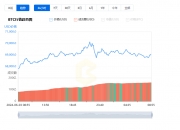笔者注意到有很多关于Web3和Web 3.0之间区别的混淆。Web3是分散化的、基于区块链的网络,而Web 3.0则是Tim Berners-Lee对链接或语义网络的愿景。
I noticed a lot of confusion about the difference between Web3 and Web 3.0. Web3 is a decentralized, block-based network, while Web 3.0 is Tim Berners-Lee's vision of a link or semantic network.
我的意思是,甚至维基百科也在加重困惑,在同一篇文章中说Web3和“基于机器可读性的概念,也称为Web 3.0,参见语义网”不是同一概念,然后又补充说Web3也被称为“Web 3.0”。下面是这个页面的截图,让你更加迷惑:
I mean, even Wikipedia is becoming more confused by saying in the same article that Web3 and “The concept based on machine readability, also known as Web 3.0, see semantic web” are not the same concept, and then adding that Web3 is also known as “Web 3.0”. Here's a screenshot of this page, which makes you all the more confused:

因此,一方面,Web3和Web 3.0之间的区别仅仅是语义上的(啊哈哈哈!糊涂!懂了吗!懂了吗?),但当Web 3.0用于讨论语义网时,它绝对不是基于区块链的Web3概念的同义词。
So, on the one hand, the distinction between Web3 and Web 3.0 is merely semantic. But when Web 3.0 is used to discuss semantic networks, it is by no means synonymous with the concept of Web3 based on the block chain.
为了清楚一些,以下是它们在某些方面的区别和相似之处,以最简洁和简单的方式:
For the sake of clarity, the following are their differences and similarities in some respects, in the most concise and simple manner:
愿景:Web3的核心理念是由以太坊的联合创始人Gavin Wood在2014年提出的,旨在通过创建一个分散化的互联网来对抗像Facebook、Amazon或Google等少数Web2巨头的集中权力和主导地位。
Vision: The core idea of Web3 was proposed in 2014 by Gavin Wood, a co-founder of the Etherms, to counter the centralized power and dominance of a few Web2 giants, such as Facebook, Amazon or Google, by creating a decentralized Internet.
这意味着什么:互联网的第一代(Web1)相当静态,只能阅读。第二代(Web2)是一个更互动和社交的版本,用户可以创建和分享自己的内容。这种Web2方法的阴暗面是,少数平台拥有和控制其用户的数据,并可以以某种不总是被认为是道德或民主的方式对其进行操纵。
What does that mean: The first generation of the Internet (Web1) is rather static and readable. The second generation (Web2) is a more interactive and social version where users can create and share their own content. The dark side of the Web2 approach is that a few platforms own and control the data of their users and can manipulate them in a way that is not always perceived as ethical or democratic.
web1: 阅读
Web1: Reading
web2: 阅读、写作
Web2: Reading, writing
web3: 阅读、写作、拥有
reading, writing, owning
这正是Web3想要解决的问题。
This is exactly what Web3 wants to solve.
它将如何解决这个问题:通过使用区块链技术、去中心化存储和自我主权身份,在社区驱动的环境中,Web3将从Web2巨头手中夺回数据所有权,并将其交还给用户。用户可以决定谁可以访问他们的数据和身份。
How it will solve this problem: In a community-driven environment, web3 will reclaim ownership of the data from the Web2 giant and return it to the user. Users can decide who can access their data and identities.
区块链是什么:简单来说,区块链是一种将信息(按时间顺序)记录在一个几乎无法更改或欺骗的方式上的系统,因为每个交易都在一个(或多个)去中心化计算机系统网络中同步。
What is the block chain? Simply put, the block chain is a system that records information (in chronological order) in a way that can hardly be changed or defrauded, as each transaction is synchronized in one (or more) centralized computer system network.
这将如何运作?用户将保留(密钥)他们所有的数据和身份,存储在像MetaMask、Venly或TrustWallet这样的加密货币钱包中。这使他们能够与其他类型的区块链应用程序进行交互,并选择谁可以读取他们的数据,谁不能。使用加密钱包登录实际上很像在其他应用程序上使用Facebook帐号登录,但你拥有和控制自己的所有数据。
How does this work? Users will keep all their data and identities (keys) stored in encrypted currency wallets like MetaMask, Venly or TrustWallet. This enables them to interact with other types of block chain applications and choose who can read their data and who can't. Use encrypted wallets to log in is actually like using Facebook accounts on other applications, but you own and control all your data.
愿景:万维网的发明者Tim Berners-Lee希望在数据层面将网络上的一切连接起来,释放其全部潜力。
Vision: The creator of the World Wide Web, Tim Berners-Lee, wants to connect everything on the network at the data level and unleash its full potential.
这意味着什么:在当前的互联网中,我们有URL或链接。这些链接将文档与彼此连接起来。是文档,而不是事实。不是原始数据。结果是你最终得到了信息孤岛。举个简单的例子:如果你换了工作并在LinkedIn上更新了这些信息,你的Fb详细信息不会更新,因为它们没链到一起。
What does that mean: in the current Internet, we have URLs or links. These links connect documents to each other. It's documents, not facts. It's not raw data. The result is that you finally got the information on the island. To give a simple example: if you change jobs and update this information on LinkedIn, your Fb details will not be updated, because they are not chained together.
Berners-Lee希望关联所有的这些信息,以便你只需更改一回,结果将是更准确,因为相同的信息将在其他任何地方关联性的出现,并且更智能。为什么是更智能呢?因为在数据层面上连接事物越多,越多的人可以访问那些自动连接好的信息,并从中挖掘和洞察。
Berners-Lee wants to connect all this information so that you just change it once, and the result will be more accurate, because the same information will be relevant anywhere else, and more intelligent. Why more intelligent? Because the more things are connected at the data level, the more people can access the information that is automatically connected, and dig and look into it.
它是如何工作的:语义网的解决方案是将所有数据存储在一个称为Solid Pod的中央位置。这使用户可以控制哪些人和哪些应用程序可以访问他们的数据。在该Pod的顶部添加了一个WebID,以便您可以在网络上进行身份识别。就像使用加密钱包一样,您可以将WebID与我们如何使用LinkedIn或FB帐户登录应用程序进行比较,但是——重要的是——不会失去对自己数据的控制。
The solution to how it works is to store all data in a central location called Solid Pod. This allows users to control who and which applications can access their data. A WebID has been added to the top of the Pod so that you can identify on the network. As with encrypted wallets, you can compare WebID with how we use LinkedIn or FB account log-in applications, but -- importantly -- do not lose control of your data.
示例:佛兰芒政府的数据实用公司(Flemish Data Utility Company)正在研究这种方法,以便佛兰芒公民可以共享数据。以下是他们对此问题的愿景,如果您有兴趣的话:
Example: The Flemish Data Practice Company of the Flemish Government is studying this method so that Flemish citizens can share the data. Here are their visions on this issue, if you are interested:
佛兰芒数据实用公司希望通过专注于负责任和安全的数据共享来增强公民对数据共享的信任。同时,我们希望通过使数据更易于发现和交换,并在公民、公司和协会之间建立桥梁以促进更好的合作,为佛兰芒经济注入活力。我们是一个中立的第三方合作伙伴和创新倡导者,我们促进经济和社会繁荣。通过这种方法,佛兰芒有潜力成为欧洲数据经济的领导者。
Flemish Data Practice wants to strengthen citizens’ trust in data-sharing by focusing on responsible and secure data-sharing. At the same time, we want to breathe life into the Flemish economy by making data easier to detect and exchange, and building bridges between citizens, companies, and associations to promote better cooperation.
所以,Web3(去中心化网络)和Web 3.0(语义网)都希望为当前被认为是有缺陷的网络提供替代方案。
Thus, Web3 (decentralized network) and Web 3.0 (semantic network) both wish to provide alternatives to networks that are currently considered to be flawed.
但它们有不同的重点。语义网或Web 3.0关注效率和智能,通过在网站之间重用和链接数据来实现。而去中心化网络或Web3关注赋权和安全,通过将数据和身份的控制权交还给大众。
But they have different priorities. Semantic networks or Web 3.0 focus on efficiency and intelligence, through reusing and linking data between websites. Decentralizing networks or Web3 focus on empowerment and security, by returning control of data and identity to the general public.
也很重要的是,它们使用不同的技术来实现目标。Web3建立在区块链上,而Web 3.0使用RDF、SPARQL、OWL和SKOS等数据交换技术。这种差异的一个重要后果是,Web3(区块链)中的数据很难更改(分散在许多地方),而Web 3.0中的数据则很容易更改。
It is also important that they use different technologies to achieve their goals. Web3 is built on block chains, while Web 3.0 uses data exchange technologies such as RDF, SPARQL, OwL and SKOS. An important consequence of this difference is that data in Web3 (block chains) are difficult to change (disperse in many places), while data in Web 3.0 are easy to change.
虽然它们的重点不同,但它们的方法有一些相似之处:都希望用户数据保持在用户的控制下。在语义网的情况下,这些数据保存在Solid pod中。在Web3的情况下,数据保存在加密钱包中。不同之处在于数据在solid pod中保持集中化,而加密钱包仅持有分散存储在区块链上的资产的密钥。
While their focus is different, there are similarities in their approaches: they all want to keep user data under user control. In the context of semantic networks, the data are stored in Solid Pod. In the case of Web3, the data is stored in encrypted wallets. The difference is that the data are centralized in the solid Pod, while the encrypted wallet holds only the keys to the assets stored in the chain of blocks.
如果有人问你它们的区别,而你记不住以上任何内容,只需装作一副冷静的表情,说“显然,二者之间的绝对核心区别是Web3是去中心化的,而Web3.0是语义的或链接的”。然后你迅速离开,以免他们有机会提出任何后续问题。另一个选择是假装接电话。
If someone asks you about their differences, and you can't remember anything about them, just pretend to be a cool face and say, “It is clear that the absolute core difference between the two is decentralized and the Web3.0 is semantic or linked.” Then you leave quickly so that they do not have the opportunity to ask any follow-up questions. The alternative is to pretend to answer the phone.
那么,最终这种区别会有多大影响呢?老实说,可能并不是很大。请记住,两者都希望创建一个更好的互联网版本,更重要的是,它们都还在不断建设中。很有可能,这种更加链接、更安全、去中心化和以用户为中心的新互联网的最终版本将是这些和其他技术(插入您想要的任何时髦词汇:元宇宙、人工智能、量子计算等)和方法的融合。
So, what is the ultimate impact of this distinction? To be honest, it may not be great. Remember, both want to create a better version of the Internet, and, more importantly, they are still being built. It is likely that the final version of this new, more connected, safer, decentralized and user-centred Internet will be a combination of these and other technologies (insert any fashionable vocabulary you want: meta-cosm, artificial intelligence, quantum computing, etc.) and methods.
关于整个Web3和去中心化讨论,最让我着迷的是:大部分讨论实际上都集中在技术上。在我多年在技术行业工作的经验中,我了解到,如果人们对技术(背后的概念)几乎着迷,那就是他们真的不知道它到底意味着什么。你可以在围绕量子计算的言辞中看到同样的动态。
And what fascinated me most about the whole Web3 and decentralizing discussion is that most discussions actually focus on technology. In my many years of experience in the technology industry, I learned that if people are fascinated by technology, it's that they really don't know what it means. You can see the same dynamic in terms of quantum calculations.
因为——除非你是工程师、程序员或类似的人 - 唯一真正重要的是一种技术对社会、公司、员工、消费者、环境等的影响。只是作为比较:是否还有人知道电力、互联网或汽车是如何工作的?我们大多数人都不知道,对吗?但我们知道如何使用它们,它们对我们造成了什么影响,以及如何改变其中一些负面后果。
Because -- unless you're an engineer, a programmer or a similar person -- the only real thing that matters is the impact of a technology on society, companies, employees, consumers, the environment, etc. -- just for comparison: does anyone know how electricity, the Internet or cars work? Most of us don't know, right? But we know how to use them, how they affect us, and how to change some of the negative consequences.
只是不要把愿景 - 在Web3的情况下是去中心化、安全、赋权等 - 当作影响。事实上,在我们对Web1甚至Web2的实际影响一无所知的时候,我们曾经见过类似的乌托邦愿景。当时有人谈论创建一个集体智慧、启蒙、群体智慧、彻底自由等等。而我们根本不知道随之而来的极化、信息过滤泡沫、个性化、猖獗的消费主义、政治操纵等等。
Just don’t think of the vision – decentralizing, security, empowerment, etc. – as an impact in the context of Web3. In fact, when we knew nothing about the actual impact of Web1 and even Web2, we saw similar utopias.
这是否意味着互联网全都是坏的?显然不是。想象一下没有互联网的情况下如何度过疫情。但我们也可以肯定地说,第一代互联网最初的乌托邦愿景与其实际影响之间存在着很大的差距。我真正相信,当前关于去中心化、赋权以及Web3将如何发展的想法之间将会有一道裂痕。
But we can also say with certainty that there is a huge gap between the original utopian vision of the first generation of the Internet and its actual impact. I really believe that there will be a rift between current ideas about decentralisation, empowerment, and how Web3 will develop.
注册有任何问题请添加 微信:MVIP619 拉你进入群

打开微信扫一扫
添加客服
进入交流群




















发表评论